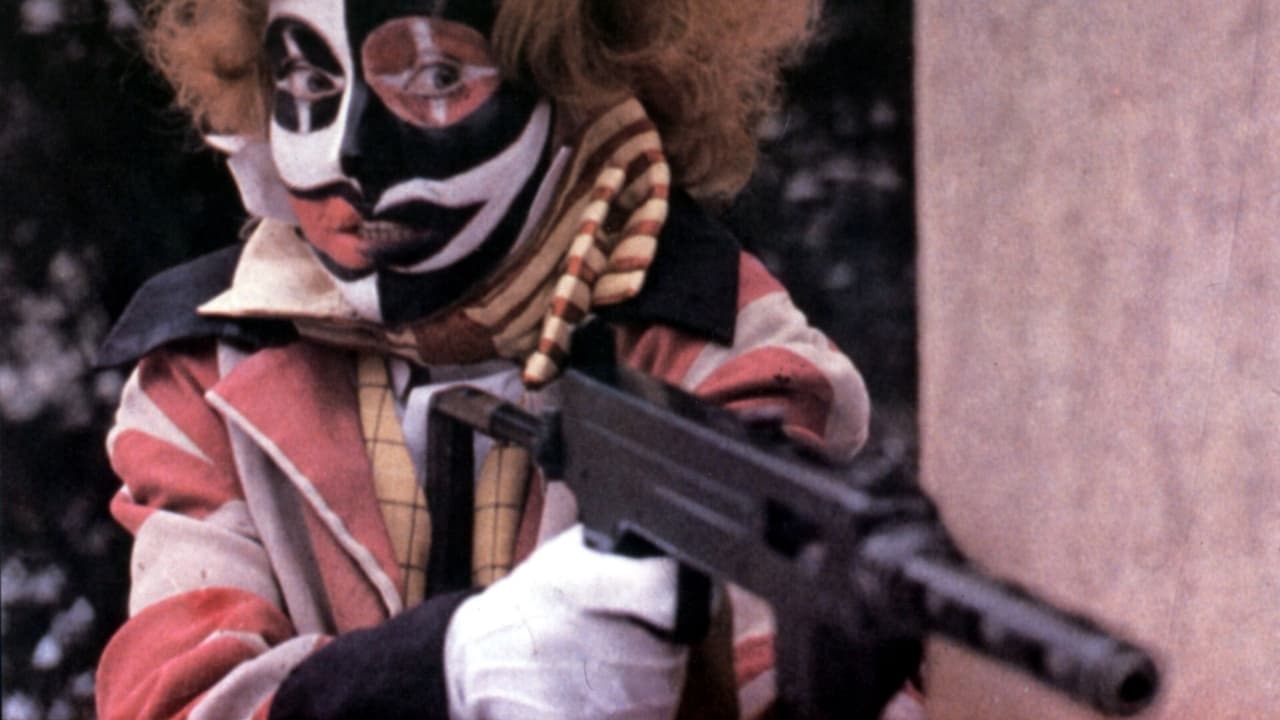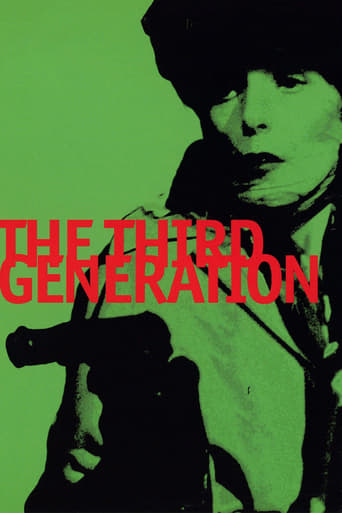tieman64
"The first generation was that of '68. Idealists, who wanted to change the world and imagined they could do that with words and demonstrations. The second, the Baader-Meinhof Group, went from legality to armed struggled and total illegality. The third's the generation of today, which simply acts without thinking, which has neither a policy nor an ideology and which, certainly without realising it, lets itself be manipulated by others, like a bunch of puppets." - Fassbinder Rainer Werner Fassbinder opens "The Third Generation" with an inscription which reads "Dedicated to someone who truly loves – so to no one, probably", a nod to Robert Bresson, made overt by the following shot, in which a camera floats above a cityscape and lands on a television screen. The screen's showing the climax of Bresson's "The Devil Probably", a film which Fassbinder adored.The power of "Generation's" opening shot is only appreciated with an understanding of what's happening at the climax of Bresson's "Devil". Here a student radical called Charles casts aside the hope and possibility of revolution and decides instead to commit suicide, an act which he views as a form of radical non-participation. "If I did anything," Charles says, "then I'd be useful in a world that disgusts me." Charles initially flirts with active resistance, of course, but eventually rejects all "shocks to the system" outright. Pay a dollar for dynamite and you're already feeding the machine you want to injure. Under capitalism – which Bresson labels "the Devil guiding all things" (a kind of parody of Smith's "Invisible Hand") - no one is an innocent bystander and, contrary to those who believe in the super-neutrality of money, all participants are perpetrators of violence. For Charles, it is simply easier to imagine the end of all life than the end of his political-economic system. A system which, because it consists of an endless Eternal Now, no longer allows for a future. Ironically, Fassbinder has Bresson's climax, which literally captures the death of a certain revolutionary spirit (Fassbinder considered himself a "utopian anarchist"), played on a television set perched in the office of an ultra rich, mega-corporate head. The on-screen death seems to birth the very Empire in which the television sits, and Bresson's film seems to itself play on a perpetual loop within this office, like a religious sacrament, worshipped by those who owe their wealth to Charles' death.Of course what all great directors were concerned about during this period was the question of where political and revolutionary agency now lies, and why the political radicalism, hopefulness and sense of urgency of the 1960s quickly morphed into disillusionment and despair (and the resultant rise in "escapism", "the Blockbuster", "apoliticism" etc). As examples, see Antonioni's "Zabriskie Point", "Hadewijch", Godard's numerous "filmed essays", particularly "La Chinoise", or even more mainstream fare like "Full Metal Jacket", where our hero smugly believes himself to be an enlightened non participant."Generation" takes the form of a dark farce about a gang of West Berliners who decide to create a terrorist cell. Fassbinder, however, paints the group as a bundle of bumbling idiots, enamoured by "adventure" and "radicalism" and carrying out violent attacks dressed in cartoonish costumes. They plan to kidnap multinational kingpin P.J Lurz "in the name of the people, for the good of the people", but are oblivious to the fact that Lurz (Eddie Constantine, mimicking Yves Montand in Costa-Gavras's "State of Siege"), owner of a multinational security firm, is dependent on their very "terrorism" to boost sales and legitimise the importance of defence contracts. In other words, capitalism monetises radicalism and terrorism fortifies rather than undoes reactionary power structures. Or as Fassbinder himself says: "terrorism is an idea generated by capitalism to justify better defence measures to safeguard capital."The film's terrorist cell is based on the Red Army Faction (aka the Baader-Meinhoff Gang), a group of ultra leftist radicals active in Germany between the 1970s and late 1990s, but it echoes even contemporary history. Think Bush/Cheney, and later the co-opted "Arab Spring". Beyond Bresson, Goddard's "La Chinoise" also plays a big influence, Fassbinder using Goddardian title cards, freeze frames, on-screen text, chapters and aural tricks. His dense walls of sound perhaps allude to Germany's increasingly right wing media, adept at exploiting public hysteria, and the everyday chatter of information technology, which dulls and distracts rather than informs its audience. Indeed, most of the film is bathed in the sounds emitted from TVs, computers and radios, their intrusive warbles forever shaping Fassbinder's characters.The title of Arthur Schopenhauer's 1819 opus, "The World as Will and Representation", is used as a password by the terrorists, but they largely miss the point of Schopenhauer's text. For the gang, one's "willpower changes the world". For Schopenhauer, however, one's will and desires undermine knowledge, reason, and are always subjugated to a larger, universal Will, impersonal forces which shape all lives. Following the will's dictates, Schopenhauer believed, leads to self deception, suffering and the worshipping of mere "representations" rather than "what's real". He advocated getting rid of "the will", which today echoes many tenets of Buddhism. And so one of the ironies of Fassbinder's film is that the very structure of the terrorist organisation resembles exactly that which they fight against, with its rigid hierarchical structure and sexist, power hungry opportunists.The film is divided into several chapters, titled "You always pull the short straw", "male same-sex relations but with no S and M", "opposite sex relations", "xenophobia as a reflection of the violence between conservatives and liberals", "sadomasochism", and "Killroy was here", the latter two titles alluding to the interpersonal dynamics which permeate the film ("Slave desperately seeks master to train me as his dog!" one card reads) and the lasting effects of the United States' presence in West Germany. 8.5/10 – Though hastily written, Fassbinder regarded "Generation" as his fourth best film. Multiple viewings required.

